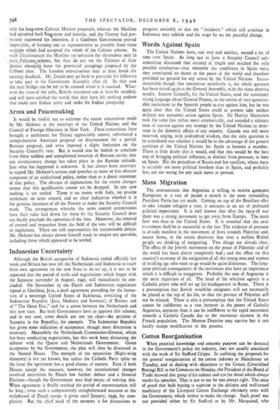Indonesian Uncertainty
Although the British occupation of Indonesia ended officially last week and Britain has now left the Netherlands and Indonesia to reach their own agreement on the new State to be set up, it is not to be expected that the period of strife and negotiations which began with the Japanese surrender in August, 1945, will immediately be con- cluded. On November 15 the Dutch and Indonesian negotiators signed at Cheribon, Java, a draft agreement providing for the forma- tion of a sovereign United States of Indonesia, consisting of the Indonesian Republic (Java, Madoera and Sumatra), of Borneo and of "The Great East," and for a union between the Netherlands and this new state. But both Governments have to approve this scheme, and in any case, some details are not yet clear—the position of Sumatra in the Republic, for example. The Indonesian Republic has given some indication of acceptance, though more discussion is necessary. Meanwhile the Netherlands Commission-General, which has been conducting negotiations, has this week been discussing the scheme with the Queen and Netherlands Government. Given acceptance by the Government, the plan will then be discussed in the Second House. The strength of the opposition (Right-wing elements) is not yet known, but unless the Catholic Party splits on the issue the agreement has a good chance of success. Even if both Houses accept the measure, however, the constitutional changes involved necessitate by Dutch law further debate and a General Election—though the Government may find means of waiving this. When agreement is finally reached the period of reconstruction will be long ; even such a comparatively straightforward measure as the withdrawal of Dutch troops is given until January, 1949, for com- pletion. But the chief need of the moment is for discussions to progress amicably so that the " incidents " which still continue in Indonesia may subside and the stage be set for peaceful change.


































 Previous page
Previous page